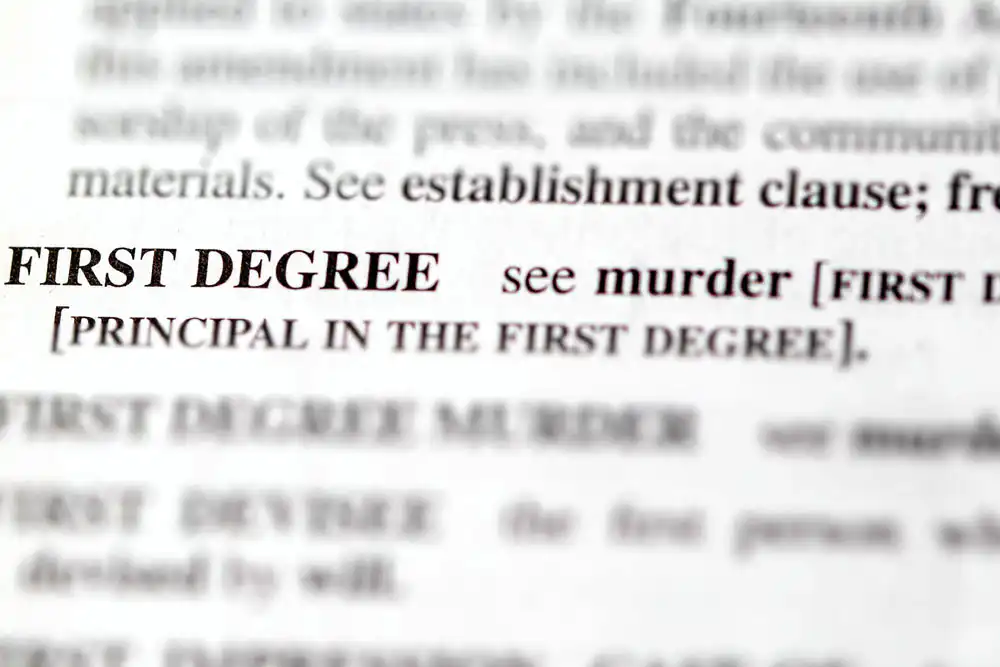
Being accused of committing murder is one of the gravest situations a person can endure, often accompanied by uncertainty, fear, and potentially life-changing consequences. In Florida, at least 1,751 individuals are currently incarcerated for felony murder alone. This statistic underscores just how seriously these charges are taken and highlights the importance of understanding the distinctions between first, second, and third-degree murder.
At Fighter Law, we know how overwhelming it can be to face such accusations. Our team, led by Board-Certified Trial Lawyers Thomas Feiter and Jessica Travis, brings years of experience and a proven track record of successful outcomes. Our dedicated lawyers are committed to providing comprehensive legal representation tailored to your unique needs.
First-degree murder is the most serious type of homicide charge. It involves premeditated intent to kill, meaning the act was planned and carried out with forethought. This category also includes felony murder, where a death occurs during the commission of another serious crime, such as robbery or kidnapping.
Florida law enforces strict penalties for first-degree murder, including life imprisonment without parole or the death penalty. Because of the severity of these consequences, securing experienced legal representation is essential. Fighter Law’s attorneys are equipped to thoroughly investigate the evidence and build a defense tailored to your unique circumstances.
Second-degree murder differs from first-degree charges in that it does not require premeditation. Instead, it involves an intentional act that demonstrates a “depraved mind” or disregard for human life, ultimately causing someone’s death. This charge may also apply in cases where the killing was unintentional but occurred as a result of dangerous behavior.
Penalties for second-degree murder in Florida are severe, often leading to decades in prison. Defending against these charges requires a thorough understanding of the law and a commitment to uncovering mitigating factors. Fighter Law’s team of compassionate and aggressive attorneys is here to help you fight for the best possible outcome.
Third-degree murder applies to cases where a person is killed unintentionally while the accused is committing or attempting to commit a non-violent felony. Unlike the first and second-degree charges, third-degree murder does not involve intent to kill or depraved indifference to human life.
While third-degree murder carries less severe penalties, a conviction can still result in significant prison time and a permanent criminal record. It is vital to work with attorneys who can analyze the circumstances of your case and challenge the evidence against you. At Fighter Law, we bring decades of experience to every case, ensuring no detail is overlooked in your defense.
Each degree of murder charge carries its unique elements and consequences. Understanding these distinctions can help clarify what prosecutors must prove to secure a conviction.
If you are facing any of these charges in Florida, the attorneys at Fighter Law will work tirelessly to safeguard your rights and explore every available defense strategy.
Defending against murder charges requires a strategic approach that considers the specifics of your case. Some common defenses include:
At Fighter Law, we tailor our defense strategies to the unique facts of your case, leveraging our legal expertise to fight for your future.
Facing murder charges can feel like an insurmountable challenge, but you don’t have to face it alone. At Fighter Law, we offer aggressive representation and compassionate guidance to help you through this difficult time. Board-Certified Trial Lawyers Thomas Feiter and Jessica Travis have extensive experience handling murder cases and know what it takes to achieve the best possible outcome.
With a female partner and a military veteran partner, our firm brings a unique and inclusive perspective to every case. Contact Fighter Law today at (407) 344-4837 or by completing our contact form for a free consultation. We are ready to fight for you.
Fill out the form below for an free evaluation of your case.
